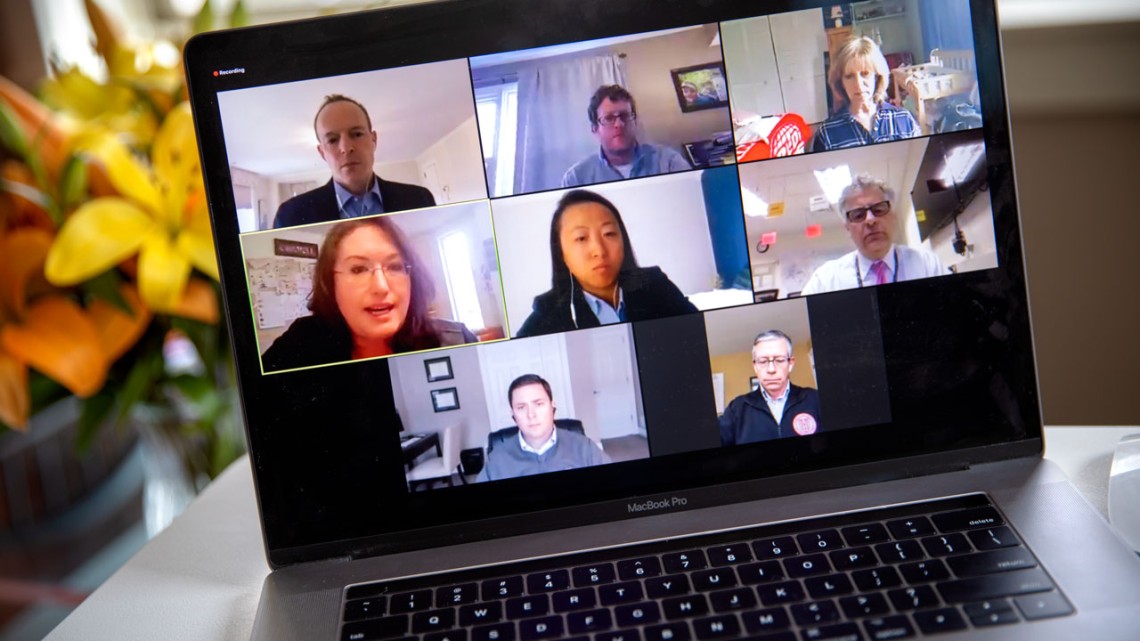
University administrators participate in an Employee Assembly COVID-19 Virtual Follow-Up Forum via Zoom Webinar March 25.
Coronavirus rewriting staff playbooks
By James Dean
For thousands of Cornell employees, the novel coronavirus has imposed new and unexpected work conditions.
Many are restricted to working from home; others support essential operations on a mostly empty Ithaca campus or provide critical medical care on the pandemic’s front lines in New York City.
“When we’re in circumstances that we haven’t experienced before, it means that the playbooks that we have have to be adjusted,” Mary Opperman, vice president and chief human resources officer, said March 25 during a virtual staff forum sponsored by the Employee Assembly. “We appreciate your patience as we do that.”
More than 2,500 participants joined the forum on Zoom to hear Opperman and other senior leaders share updates on the way forward, and praise staff, faculty and students who are making the best of a difficult situation and supporting the community in myriad ways.
A replay and transcript of the forum are available here. The forum followed one on March 18 that unintentionally limited participation.
One week later, the Cornell community has grown more familiar with the new reality, as classes near a transition to virtual instruction and all but about 3% of undergraduate students have vacated on-campus housing to return home.
The reduced need for student services has some employees concerned about job security. Opperman reiterated that the university has been focused on immediate challenges and will provide more information as the financial impacts of the public health crisis become clearer.
“We are doing everything we can to safeguard the meaningful work of our staff,” she said. “We have been very consistently supportive of our workforce, and we’re going to continue to do that.”
Ryan Lombardi, vice president for student and campus life, offered “a very hearty thank you” to staff supporting the students who were unable to leave campus.
“Ithaca and our campus is their home, and so we really appreciate your continuing to serve them and support them while they are here,” he said. “It’s very important while you’re doing that to do all we can to support your health and safety.”
Adam Howell, chair of the Employee Assembly, also expressed appreciation for the staff who are “keeping the lights on, keeping things going, keeping those students who are forced to stay on campus safe and fed.”
The leadership team said a detailed analysis had been performed of all job functions to determine which positions – such as health care workers – needed access to special personal protective equipment. All staff members are being asked to practice social distancing of at least 6 feet, wash their hands frequently and avoid touching their faces, while taking time for general wellness.
Dr. Anne Jones ‘04, director of medical services for Cornell Health, explained that the Tompkins County Health Department, which had confirmed 23 positive cases of COVID-19 as of March 25, is leading thorough investigations of potential exposures across the community.
“This is a community effort to get through together,” Jones said. “Very careful and meticulous contact tracings are done in each and every case.”
Rick Burgess, vice president for facilities and campus services, said a less populated campus is helping to minimize risk, and essential crews will work in rotations. Teams are securing unoccupied facilities and implementing energy-saving measures. Campus police are patrolling at full strength with auxiliary support. Any employees with safety concerns, the leaders said, should discuss them with supervisors or senior leadership.
Working from home poses its own challenges, Burgess said.
“Everybody’s routine has been thrown into disarray – I know mine has,” he said, encouraging all employees to proactively check in with colleagues from time to time.
Mindful of New York Gov. Andrew Cuomo’s order for only essential services to report to work, employees have been asked not to visit their offices except for essential needs, in consultation with supervisors.
Joel Malina, vice president for university relations, cited several examples of Cornellians supporting the broader crisis response, including volunteers sewing surgical masks in Bartels Hall and donating other medical supplies, helping the Food Bank of the Southern Tier to distribute food, and student organizations contributing unneeded activity fees to the Access Fund assisting low-income students, now totaling some $270,000.
“It is incredible to see the outpouring of compassion, empathy and actual dedication of time and effort to try to help our community,” Malina said.
Employees interested in offering their services can contact supervisors and leadership who are working in concert with Tompkins County emergency managers, and can consider donating to the United Way of Tompkins County. Those with the means to do so were encouraged to order food from struggling local restaurants.
Acknowledging how stressful the current environment can be, Opperman shared advice she received from President Martha E. Pollack: Focus on the things you can control, get rest and breathe.
“We will get through this,” Opperman said. “We’ll get past this as a world, as a country, as a community and as a campus, so have faith.”
Media Contact
Get Cornell news delivered right to your inbox.
Subscribe
